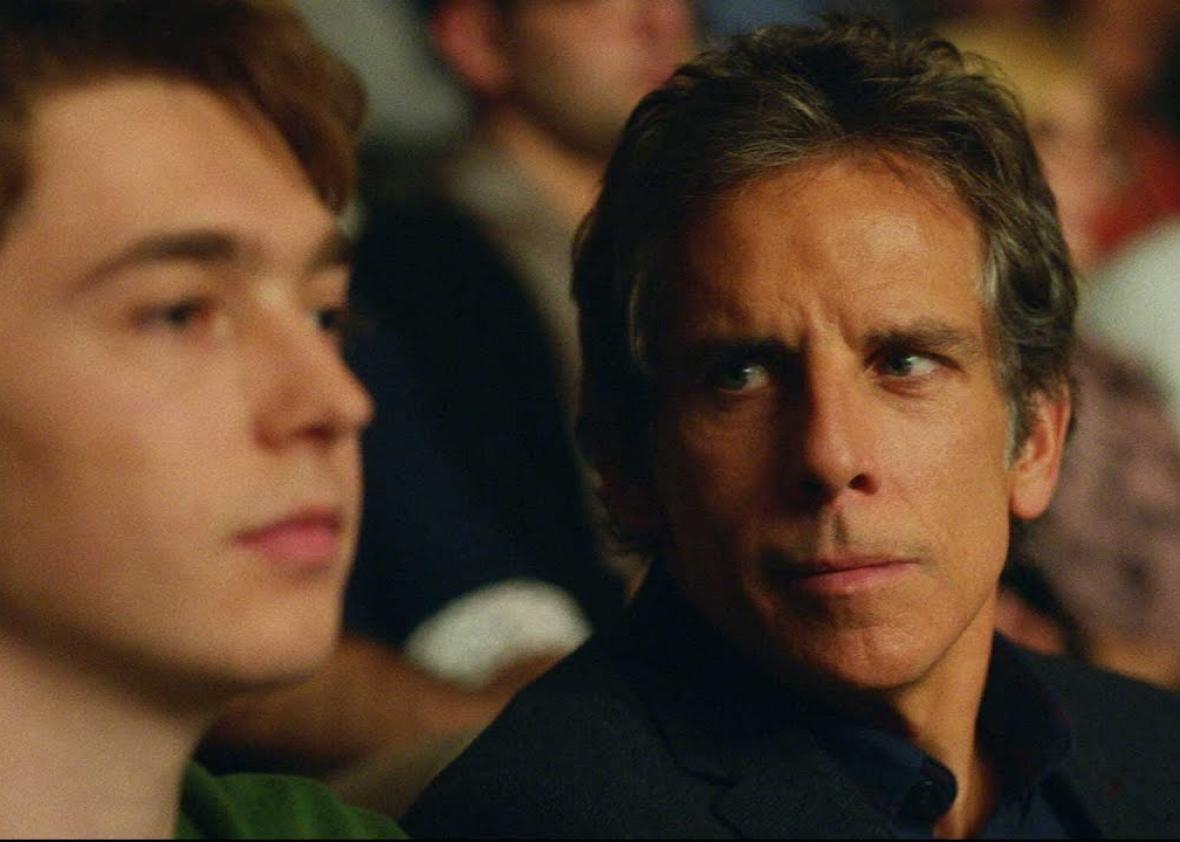Writer-director Mike White has a way of turning the camera around on anxious viewers and making them confront their own worst selves. The experience can be both unnerving and thrilling. That’s never been truer than with Brad’s Status, his new comedy of misery about an aging father (Ben Stiller) taking his teenage son on tours of New England colleges he wasn’t good enough to attend. White has made possibly his most pathetic character yet, one he’s happy to admit was partly drawn from himself.
One of our foremost bards of cathartic despair, White made his career writing fantastically dark comedies with impossible characters, including Chuck and Buck, The Good Girl, and this past June’s Beatriz at Dinner. With Enlightened, White’s great, short-lived HBO series, he showed just how moving and satisfying that mode can be. Below, White helped us deconstruct Brad’s Status as a stealth horror movie, as a haunted lament for the middle-class white male, and as a reckoning for anyone who has ever felt FOMO from an Instagram post.
Jeffrey Bloomer: I was surprised to realize this is only the second feature you’ve ever directed, after 2007’s Year of the Dog.
Mike White: Directing is, for me—it’s fun, but in the same way that bungee jumping is fun. I wouldn’t want to live in that space all the time, because it takes a lot out of me. Directing is a lot about managing people. If it were just the more intimate parts of it, I would do it more.
So why direct this screenplay and not your others?
Sometimes it’s easier to just do it yourself than to try to manipulate a director into doing what you want. I thought, I’m gonna be too passive aggressive on this one, I’m gonna be annoying, and I should just do it myself.
You’ve been open in the past about taking from your own life, as with Enlightened, which drew from your own professional breakdown.
Yeah.
I couldn’t help but notice that Brad (Stiller) is 47 years old, which you turned earlier this summer.
As I was gestating ideas, I realized how much of my time is trying to assess: Am I successful? A good review comes and I’m like, “Yeah!” Or a bad review nails me, and I’m like, “Ugh, I’m a piece of shit.” I don’t think it’s just me. I spend so much time in this headspace, and it’s embarrassing. Sometimes I feel like when I recognize something that I find embarrassing about myself, it’s worth deconstructing, instead of running from it.
You specialize in characters who can be challenging, to put it mildly, but even for you, Brad is brutal. You’re particularly merciless with him.
Honestly, I was attempting to do it with empathy, because I do relate to the character. I also felt like there was a satirical asset to it that just called for that. He’s kind of a monomaniac, and I think that gives the movie an idea, and so in that sense he’s a little, yeah, he’s extreme, but I’ve definitely had those moments.
I had a movie come out that I had a credit on, The Emoji Movie. I worked on it three weeks; I don’t even know how I got credit on it. It’s, like, reviled, and even though I don’t think it has any reflection on me, I’m at a wedding, and the whole time I’m like, “Mmm … ” It’s kind of a depressive, self-obsessed shame spiral. A lot of people who I’ve—just anecdotally—shown [Brad’s Status] to feel kind of pegged by the character. People were like, “That’s the most terrifying movie I’ve ever seen.”

Kevin Winter/Getty
It is terrifying. It kind of plays like a horror movie.
My hope is that it’s not just a grotesquery. My hope is that you see the human side of him, too. It is somewhat of an extreme situation.
I think you do by the end—
I think there’s gonna be a lot of—I think the whole “straight, white guy and his discontents” is gonna come up. It’s interesting how some people have less sympathy for that than others.
I assumed you were pushing those buttons on purpose, because Brad has a speech about how white males are the real underdogs now. And there is some clear campus politics satire.
I have a lot of thoughts on identity politics and all of those things, but I think about what Brad says it at the end of that scene with the girl: “I know you think I’m a cliché, but this is my life.” In certain places, there’s little empathy for a guy like this, you know? They’re having their own sort of identity issue, and people have little sympathy for it. Rightfully, probably, but these guys exist.
Did you write this with Ben Stiller in mind? He’s had a few parts that are superficially similar, like his Noah Baumbach films.
It was not written for Ben. What I liked about the idea of Ben in it was that there are certain kinds of bells and whistles in the beginning that made it seem like, “Oh, this is a Ben Stiller movie.” People are gonna feel like, oh, they’ve seen this before. Then the hope is that these more melancholy strains kind of subvert that. It was exciting to me to present Ben Stiller, then have it have those different colors.
I have to tell you my favorite part of the movie is when Brad’s son looks at him and just asks, “What is wrong with you?”
I liked the idea that the kid is the grounded one. I experienced that sometimes with my dad. At the same time, as a writer, that happens a lot to me where I’m really locked in my head, and the other person is just like, “Hello?”
This movie has a lot of major actors in tiny parts, like Luke Wilson, Michael Sheen, Jemaine Clement—
The casting was tricky, because a lot of it is one side of a phone call or just a fantasy or just a flashback or something like that. You needed somebody who you just feel like is gonna kind of pop in there and tell the story. I was lucky to get all those guys.
Why did you decide to cast yourself? You don’t even speak, but your part, as an old friend who shunned Brad from his wedding, is particularly fun.
Honestly, it was just practical, because that character had no lines but we needed him in all our locations. The guy who plays my partner (Xavier Grobet) is also the DP of the movie. The character is about [realizing that] you also sometimes can be that oppressive person for someone else. With my own summer vacation trips, am I making my friends who are sitting in their office be like, “Fuck you”?
It’s like the classic Romy and Michele moment, when Heather Mooney (Janeane Garofalo) realizes she was also somebody’s asshole in high school.
Yeah, exactly. Everyone has a touchstone of envy and comparative hell.
Comparative hell! OK, last question, and sorry in advance. You know there’s a Deadwood movie coming, and nothing is dead on TV anymore. So why isn’t there an Enlightened movie?
I don’t know. Of all [HBO’s] critically well received shows that I think they’ve tried to bring back, they’ve never thrown us a bone.
I remember when the show was cancelled, you said you had another season in you—
What I had planned I don’t think would necessarily work since Amy would be older now. It was gonna come right on the heels of what had just occurred, so I’d have to kind of come at it from a different perspective. I don’t know. That was the thing that was frustrating about that—just when it started to feel like it was catching some kind of wave, it ended. And I can tell you no one has asked about it.
This conversation has been condensed and edited.
